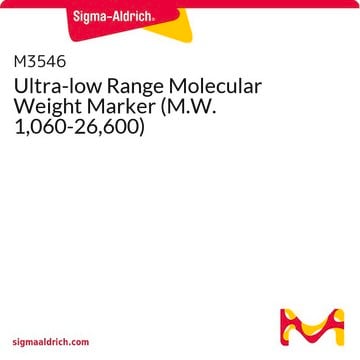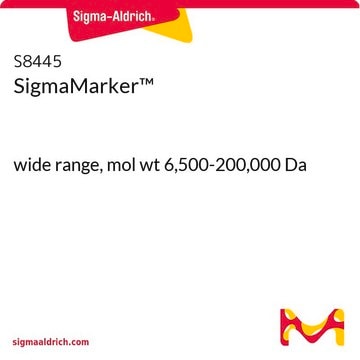C6210
Color Marker Ultra-low Range (M.W. 1,060-26,600)
Synonym(s):
protein markers, protein molecular weight markers, protein standards
Sign Into View Organizational & Contract Pricing
All Photos(1)
About This Item
UNSPSC Code:
41105337
NACRES:
NA.25
Recommended Products
form
liquid
usage
sufficient for 20 applications (on 10 cm × 10 cm mini gels)
storage temp.
−20°C
Related Categories
Application
Color Marker Ultra-low Range (M.W. 1,060-26,600) is for use in Tris-Tricine SDS-PAGE.
This sigma marker has been used in sodium dodecyl sulfate–polyacrylamide gel electrophoresis (SDS-PAGE).
This sigma marker has been used in sodium dodecyl sulfate–polyacrylamide gel electrophoresis (SDS-PAGE).
Packaging
Each vial of Color Marker Ultra-low Range (M.W. 1,060-26,600) contains 200 μl of a solution of six dye-conjugated polypeptides in 10 mM Tris-HCl, pH 7.0, 0.5% SDS, 2 mM EDTA, 4 M urea, 33% glycerol and 0.01% sodium azide.
Storage Class Code
10 - Combustible liquids
WGK
WGK 1
Flash Point(F)
Not applicable
Flash Point(C)
Not applicable
Choose from one of the most recent versions:
Already Own This Product?
Find documentation for the products that you have recently purchased in the Document Library.
Q Li et al.
British journal of cancer, 97(3), 420-425 (2007-07-12)
It is known that interferon-gamma (IFN-gamma) is produced by activated T and NK lymphoid cells, mononuclear cells, and macrophage and dendritic cells. Our previous studies have shown that IFN-gamma-like immunoreactivity also appears in human adrenal cortical tumour and phaeochromocytoma. To
Maren Thomaier et al.
Biochemistry, 55(48), 6662-6672 (2016-12-10)
The interaction of the amyloid-β protein (Aβ) with neuronal cell membranes plays a crucial role in Alzheimer's disease. Aβ undergoes structural changes upon binding to ganglioside GM1 containing membranes leading to altered molecular characteristics of the protein. The physiological role
AKAP79-mediated targeting of the cyclic AMP-dependent protein kinase to the beta1-adrenergic receptor promotes recycling and functional resensitization of the receptor.
Gardner LA, et al.
The Journal of Biological Chemistry, 281, 33537-33553 (2006)
Our team of scientists has experience in all areas of research including Life Science, Material Science, Chemical Synthesis, Chromatography, Analytical and many others.
Contact Technical Service








